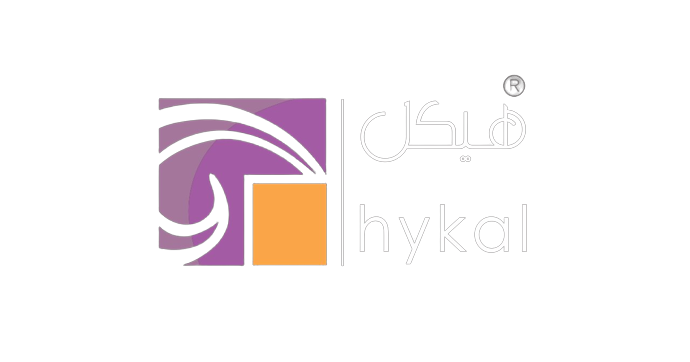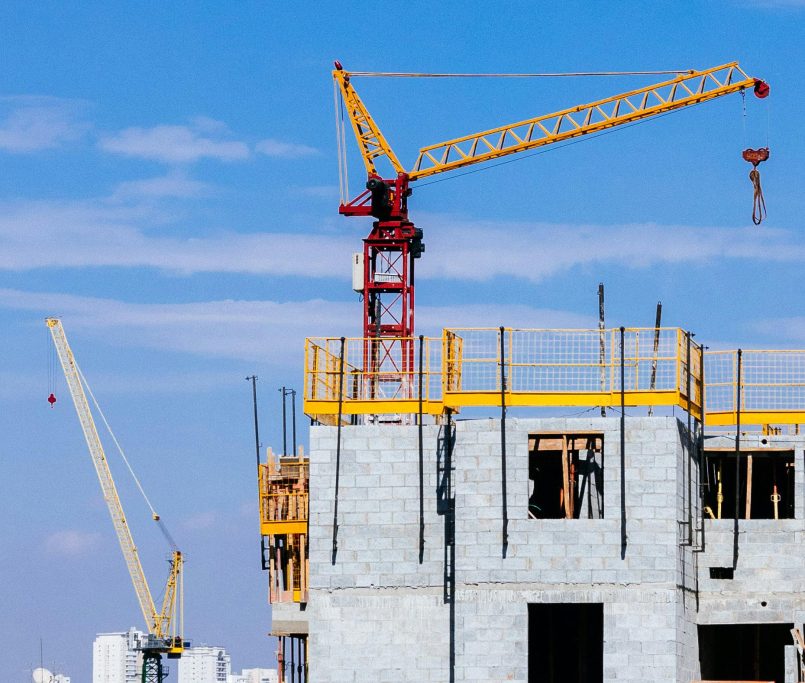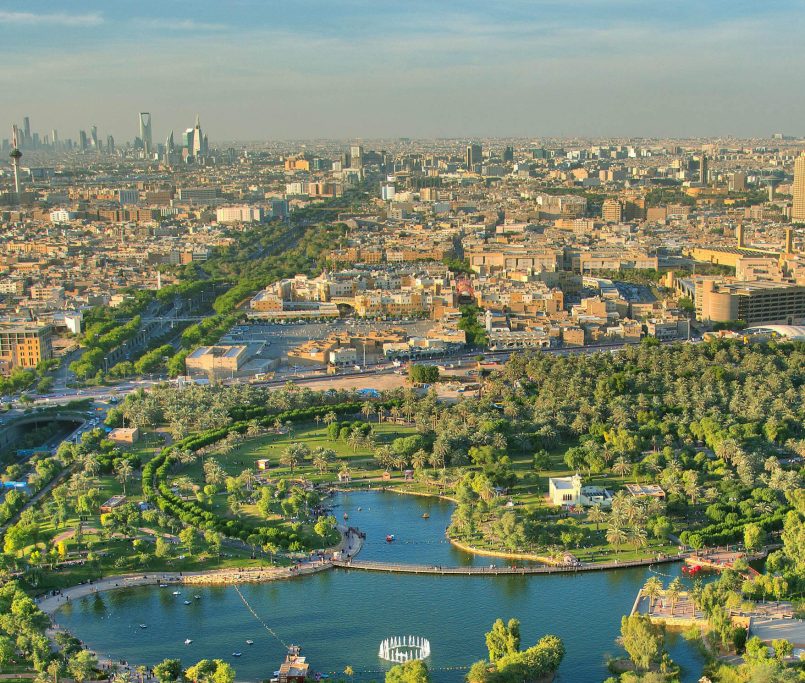The Riyadh Metro: A New Era of Connectivity for Saudi Arabia
The Riyadh Metro: A New Era of Connectivity for Saudi Arabia
As a leading architecture and engineering consultancy based in Riyadh, we at HYKAL are excited to witness the launch of the Riyadh Metro, a landmark project that promises to transform the city’s transportation landscape. While we were not directly involved in the development of the metro system, we fully recognize its monumental significance not only for Riyadh but for the entire Kingdom of Saudi Arabia. The Riyadh Metro, part of the King Abdulaziz Public Transport Project, will enhance connectivity within Riyadh and across the Kingdom, marking a crucial step toward realizing Saudi Arabia’s Vision 2030.
Connecting Riyadh to the Future
The Riyadh Metro represents a critical part of the effort to address the city’s growing population and urban sprawl. Riyadh, with its bustling streets and expanding districts, has long faced challenges related to traffic congestion and the need for modern transportation infrastructure. The metro system, designed to serve millions of people daily, will help alleviate these issues by offering a fast, efficient, and sustainable public transport solution.
Comprising six distinct lines, the Riyadh Metro will cover a total distance of 176 kilometers and feature 84 stations. The system will initially serve an estimated 1.2 million passengers per day, with projections suggesting that this number will rise to 3.6 million daily once the system is fully operational. The metro is scheduled to open in phases, with the first three lines launching on December 1, 2024, followed by the remaining lines opening by January 2025.
These opening dates mark the beginning of a new era of connectivity not only for Riyadh but also for the broader region. The metro will link key areas of the city, including residential neighborhoods, business districts, medical centers, and educational institutions, making it easier for residents to move around and access essential services. Furthermore, the metro will be integrated with the Riyadh Bus service, which began operating in 2023, creating a comprehensive and efficient public transport network that will serve the city and its people.
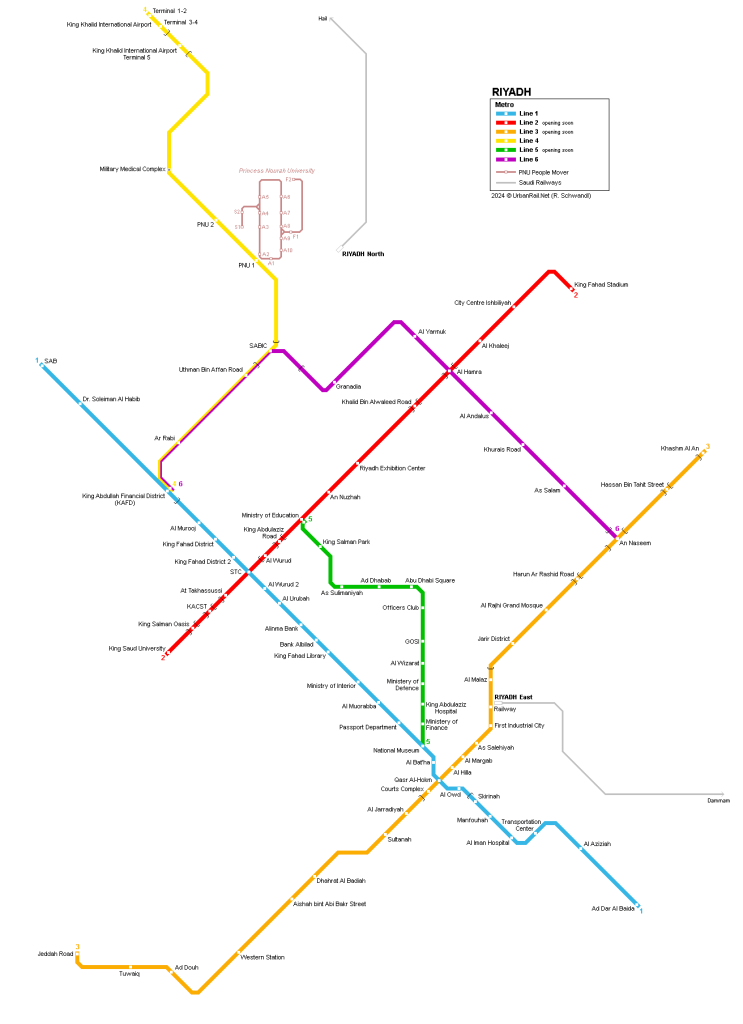
A Hub for Regional Connectivity
The Riyadh Metro is poised to play a pivotal role in the broader vision of regional connectivity within Saudi Arabia. By linking important areas in Riyadh, including King Abdullah Financial District (KAFD), King Khalid International Airport, and major residential and commercial centers, the metro will become a key element in the Kingdom’s plans to streamline travel within the city and between regions. Additionally, the metro’s connections to the bus system and the airport ensure that Riyadh’s public transportation network will serve not just the capital but also visitors and residents from across the Kingdom.
Riyadh has long been a central hub for business, education, and government in Saudi Arabia. With the opening of the metro system, the city will become even more accessible, enhancing its position as a global city in the heart of the Middle East. The improved connectivity will support the Kingdom’s economic goals by facilitating the movement of people and goods and encouraging investments in areas around the metro stations.
Moreover, the metro will serve as an example of modern urban development and infrastructure, attracting further interest from international investors and developers. Its influence is expected to extend beyond Riyadh, influencing similar public transport projects in other Saudi cities and across the region.
Architectural and Engineering Excellence
From an architectural and engineering standpoint, the Riyadh Metro is an impressive feat. The stations are designed with a focus on both functionality and aesthetics, combining modern design elements with practical features that will enhance the overall passenger experience. As part of Riyadh’s urban transformation, the metro stations will serve as landmarks in the city, providing not just transportation solutions but also contributing to the visual appeal and architectural diversity of the urban landscape.
The metro trains themselves will be fully automated, equipped with the latest technology to ensure safety, efficiency, and reliability. The system will also utilize solar energy, with solar panels installed at stations to supply 20% of the energy required to run the stations. This commitment to sustainability aligns with Saudi Arabia’s Vision 2030, which emphasizes reducing the Kingdom’s carbon footprint and advancing green technologies.
At HYKAL, we appreciate the significance of such projects in shaping the built environment and improving quality of life. While we were not directly involved in the development of the Riyadh Metro, we recognize that its design and execution are prime examples of the level of sophistication that is becoming increasingly prevalent in the Kingdom’s infrastructure projects.
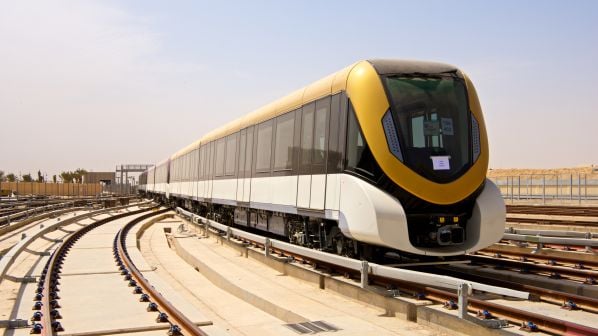
Environmental Benefits and Sustainability
The Riyadh Metro is not just a response to urban challenges; it is also a crucial part of Saudi Arabia’s commitment to environmental sustainability. By offering a more energy-efficient alternative to private car usage, the metro system is expected to significantly reduce the number of car journeys in the city. It is estimated that the Riyadh Metro will help eliminate around 250,000 car trips per day, which will, in turn, decrease the city’s overall fuel consumption.
The metro system’s eco-friendly design includes the use of solar panels to reduce energy consumption and the incorporation of energy-efficient technologies. By shifting more people to public transport, Riyadh will be able to cut down on traffic congestion and improve air quality, thus contributing to a healthier and more sustainable urban environment.
This focus on sustainability and green technologies aligns perfectly with Saudi Arabia’s broader environmental goals. The Riyadh Metro is a key step toward the Kingdom’s Vision 2030 targets, which include creating a more sustainable and diversified economy that reduces the country’s dependence on fossil fuels.
Impact on Daily Life and Economy
The Riyadh Metro is expected to have a profound impact on the daily lives of the city’s residents. For commuters, the metro will offer a fast, reliable, and affordable alternative to driving, reducing the time spent in traffic and making travel across the city more convenient. With services running daily from 6:00 AM to midnight, the metro will offer flexibility for commuters and help to ensure smooth, continuous movement within the city.
In terms of the economy, the metro will stimulate growth in areas surrounding its stations. Real estate developments and commercial enterprises are likely to thrive in these areas, creating new opportunities for businesses and residents alike. The metro will not only improve accessibility but also provide a boost to sectors such as tourism, retail, and hospitality, contributing to the diversification of the Kingdom’s economy.
Furthermore, the metro will help foster greater social integration by improving access to education, healthcare, and employment opportunities. It will make it easier for residents from all walks of life to travel to different parts of the city, supporting greater inclusivity and mobility.
Looking Ahead: A New Era of Connectivity
As the Riyadh Metro opens its doors, we look ahead to the immense benefits it will bring to the city and the Kingdom. The system is more than just a transportation network; it represents a bold step toward the future, offering sustainable, efficient, and inclusive mobility solutions that will enhance the quality of life for Riyadh’s residents and visitors alike.
For us at HYKAL, it is inspiring to see how such projects are reshaping Riyadh’s urban fabric. We are proud to be part of a city that is embracing the future with such ambitious projects, and we look forward to the continued growth and development of Riyadh and the Kingdom as a whole. The Riyadh Metro will undoubtedly become an iconic symbol of the city’s modernization, reflecting its commitment to connectivity, sustainability, and innovation.
